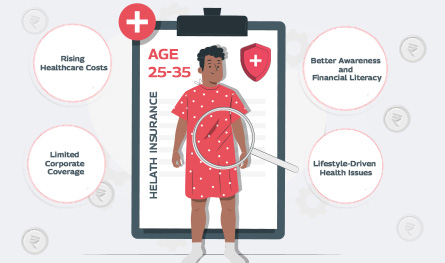What Happens If You Provide False Information On A Life Insurance Proposal Form?
.png)
What consequences does it bring upon the insured if the person offers wrong information on his/her life insurance proposal form? Let us find out in this post!
.png)
Providing wrong information on the proposal/application form of life insurance policy can bring forth consequences that will not just affect the insured but his/her family as well. Let us see the effects that it might bring if you intentionally offer wrong information to your insurer.
Giving wrong information on the life insurance application form is not at all okay as it may cost you hugely. Let’s find out how?
Every person looking to buy term life insurance has to complete the procedure of filling the application form before he/she could avail a cover of life insurance. In this application, the candidate has to offer certain information with regards to his/her finances, career as well as health and other details as required by the insurer. All such details help the insurer to determine the level of risk that the individual poses. Moreover, they are also used to consider the premium amount that the insured would pay.
Thus, it may seem tempting enough for the insured to hold back certain details or give wrong information so that they could lower the premium price of their life insurance cover or gain any other benefit. However, the fact is, it is extremely important to provide only the correct and genuine information in the proposal form. This is because, if the insurer finds out the lies of the applicant, they may take strict action on the person.
Well, before talking about the dire consequences of such action, let us understand the significance of the proposal form in the first place.
What do you mean by Life Insurance Proposal Form?
A life insurance proposal form is an application that serves as a legal document which the policy seeker needs to fill with his/her personal details. These details support the insurance company in understanding the individual well and thus require all necessary details of the applicant. The information allows the insurer to underwrite while selling the policy.
Among the many inputs or details required to mention in the proposal form of a life insurance policy, the details of your age in years, your annual income as well as your occupation plays a great role. The age of the applicant helps in deciding the premium amount, while the income details decide the coverage level that can be allowed. The applicant also needs to fill the nominee details in the form so that they can make sure to give the insurance benefit to the right beneficiary.
Effects of Providing Wrong Facts on the Proposal Form of your Life Insurance Cover
Below are some situations that may arise if the applicant is caught lying on Life Insurance proposal form or giving misleading information on the proposal form :-
- In many cases applicants hold back information regarding a medical condition that they are suffering from with the intention of getting lower premiums. However, if the insurance company come to know about it, they might just raise the premium so that they could adjust the loss accordingly
- Further, if the insurer finds multiple discrepancies or serious errors, they might start an investigation. And in case, the investigation reveals an undisclosed ailment or medical condition of the insured, they may close the policy and also prevent the person from buying life insurance policy for a particular duration.
- In the worst case scenario, the consequences of lying or hiding facts on the proposal form can lead to refusal of claim benefit altogether. So, when the insured dies and the insurance company finds out that the person has lied, the nominee might be denied the death benefit.
This happens in case the policyholder misguides the insurer by lying about something extremely serious like a severe medical condition or any other information to get benefits on life cover. Hence, it is better to be honest while filling the life insurance proposal form to prevent such a situation.
3-Year Clause
There is a 3 year clause fixed for the insurers by the Insurance Amendment Act 2015 section 45 which says that a term life insurance policy cannot be canceled on any ground after 3 years of issuance of the policy. Thus, it means that the insurer has 3 years within which they can raise objections regarding whatever is declared on the policy application. However, the regulator doesn’t specify that frauds are barred from the scope of influence of the 2015 Act and so if claims are found to be fraudulent will not be paid.
Hence, despite this clause it is advised that the insured should reveal everything honestly in the proposal paper at the time of availing insurance.

Author Bio
Paybima Team
Paybima is an Indian insurance aggregator on a mission to make insurance simple for people. Paybima is the Digital arm of the already established and trusted Mahindra Insurance Brokers Ltd., a reputed name in the insurance broking industry with 17 years of experience. Paybima promises you the easy-to-access online platform to buy insurance policies, and also extend their unrelented assistance with all your policy related queries and services.
Other Life Insurance Products
Latest Post
.png)
When you're planning to take a personal loan, knowing your monthly EMI in advance can help you stay financially prepared. The Muthoot Personal Loan EMI Calculator is a simple and efficient tool that provides instant EMI estimates based on your loan amount, interest rate, and tenure.


Relocating your two-wheeler to a different state needs to follow many procedures. Depending on the duration for which you are moving to the new place, it becomes necessary to transfer your vehicle papers if it is for more than a year. Although tedious, the process of relocating vehicles can become easy if you follow certain tips mentioned in this post. Read on!


In what’s being called a quiet healthcare revolution, India’s young working professionals are reportedly making the most health insurance claims – outpacing even senior citizens. Surprised? So are the insurance providers. Young adults ranging between 25 and 35 years, who are often assumed to be in peak health, are now dominating the charts in health insurance claims by age.


If you think lifestyle-related health issues only show up after 40, think again. Youth no longer guarantees immunity. Today’s 25 - 35 age group is increasingly facing medical issues that only plague older adults. The reason? Long working hours at the desk, deliveries on speed dial, and a social life that rarely includes a decent amount of sleep are some of the reasons for the early onset of medical conditions like diabetes, anxiety, and hypertension.


.png)
